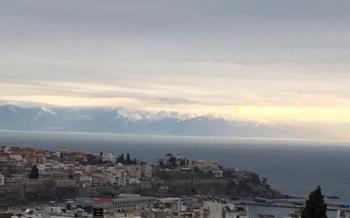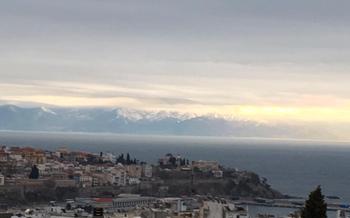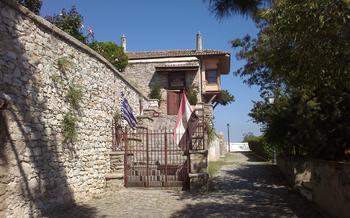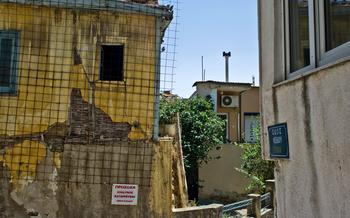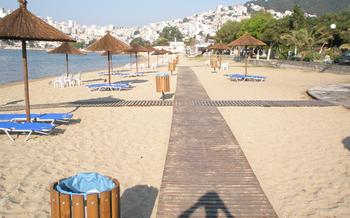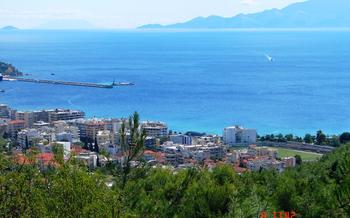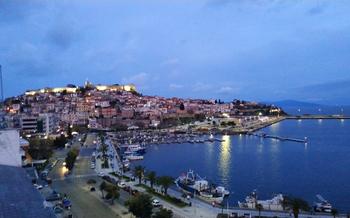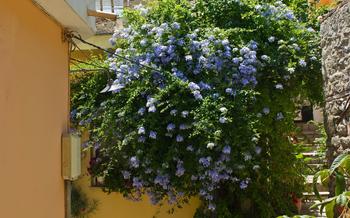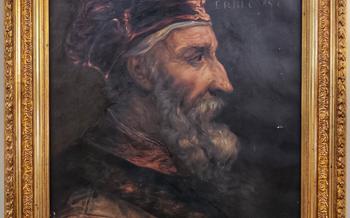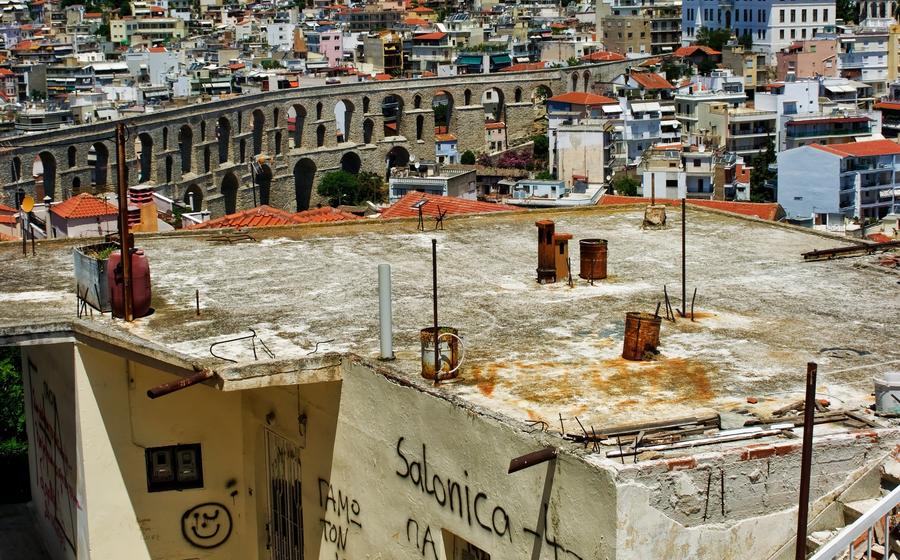
Folklore Museum of Kavala
- Historical Background
- Location and Accessibility
- Museum Hours and Admission Fees
- Traditional Crafts and Handicrafts
- Local Customs and Traditions
- Interactive Displays and Activities
- Educational Programs and Workshops
- Temporary Exhibitions and Events
- Gift Shop and Souvenirs
- Photography and Videography
- Accessibility for Visitors with Disabilities
- Guided Tours and Audio Guides
- Nearby Attractions and Points of Interest
- Insider Tip: Hidden Gem
Historical Background
Kavala, a picturesque city in northern Greece, boasts a rich history dating back to ancient times. The Folklore Museum of Kavala stands as a testament to this rich heritage, preserving and showcasing the cultural traditions and customs of the region. Established in 1974, the museum plays a crucial role in safeguarding the intangible heritage of Kavala and providing visitors with a glimpse into the city's past.
The Folklore Museum of Kavala is housed in a beautifully restored 19th-century mansion, known as the "House of Mehmet Ali." This historic building, once the residence of the renowned Egyptian ruler Muhammad Ali Pasha, adds to the charm and significance of the museum. The museum's collection reflects the diverse cultural influences that have shaped Kavala over the centuries, including Greek, Ottoman, and Armenian influences.
Location and Accessibility
The Folklore Museum of Kavala is conveniently located in the heart of the city, on Ermou Street, one of Kavala's main pedestrianized shopping streets. It is housed in a beautifully restored 19th-century building, known as the "Old City Hall," which adds to the museum's charm and historical significance.
Reaching the museum is a breeze, whether you choose to walk, take public transportation, or drive. For those arriving by foot, the museum is just a short stroll from the city center and the picturesque harbor. If you prefer public transportation, several bus lines stop within walking distance of the museum. Once you arrive in Kavala, ask for directions to Ermou Street, and you'll easily find the museum.
For those driving, limited street parking is available in the vicinity of the museum. However, we recommend using one of the nearby public parking lots to avoid any inconvenience. The closest parking lot is situated just a few minutes' walk away, ensuring a hassle-free museum visit.
Museum Hours and Admission Fees
The Folklore Museum of Kavala welcomes visitors with open doors during specific hours of operation. To ensure a smooth and enjoyable experience, it is essential to be aware of the museum's opening times. Currently, the museum is open from Tuesday to Sunday, allowing visitors to immerse themselves in Kavala's rich cultural heritage during these days.
Admission fees are a nominal contribution towards the museum's ongoing preservation and development efforts. Adult visitors are required to pay a standard ticket price, while children and students can take advantage of discounted rates. The museum recognizes the importance of accessibility and offers free admission to children under the age of six, making it an ideal destination for families with young explorers.
Traditional Crafts and Handicrafts
The Folklore Museum of Kavala proudly showcases the rich tradition of crafts and handicrafts that have played a vital role in the cultural heritage of the region. Visitors can admire a diverse collection of handmade items that reflect the skills and creativity of local artisans.
Among the notable crafts on display are intricate woven textiles, featuring vibrant colors and traditional patterns. These textiles, often crafted using looms, showcase the artistry of local weavers and the significance of textile production in Kavala's history.
Another highlight of the museum's collection is the hand-embroidered garments, adorned with delicate motifs and intricate designs. These pieces showcase the exceptional needlework skills of local women and the importance of embroidery in traditional Kavalan attire.
The museum also features a variety of handcrafted pottery, ranging from decorative vases to utilitarian cookware. These ceramic pieces demonstrate the skill of local potters and the significance of pottery in everyday life.
The collection also includes hand-carved wooden objects, such as furniture, utensils, and decorative items. These pieces showcase the artistry and craftsmanship of local woodworkers and the importance of woodworking in Kavalan culture.
These traditional crafts and handicrafts not only represent the creativity and skill of Kavalan artisans but also serve as a reminder of the region's rich cultural heritage. Visitors to the Folklore Museum can gain a deeper appreciation for the traditions and customs that have shaped Kavalan society over the centuries.
Local Customs and Traditions
The Folklore Museum of Kavala not only showcases artifacts and crafts but also offers a glimpse into the vibrant local customs and traditions that have shaped the region's cultural identity. Visitors can explore exhibits dedicated to traditional festivals, rituals, and ceremonies, each telling a unique story of Kavala's rich heritage.
One fascinating exhibit highlights the traditional wedding customs of the region. From elaborate bridal costumes and dowry preparations to the lively wedding processions and feasts, visitors can immerse themselves in the joyous atmosphere of a traditional Kavala wedding.
Another exhibit focuses on religious traditions, showcasing icons, vestments, and other sacred objects used in local churches and monasteries. Visitors can learn about the unique customs and rituals associated with religious holidays, such as Easter and Christmas, which are deeply ingrained in the local culture.
Through interactive displays and informative panels, the museum also sheds light on the traditional music, dances, and storytelling traditions of Kavala. Visitors can listen to recordings of traditional songs, watch videos of local dances, and discover the art of storytelling, which has been passed down through generations.
One particularly intriguing tradition is the "Panagiri," an annual festival held in honor of a local saint. During the Panagiri, the streets come alive with music, dancing, and traditional food, as locals gather to celebrate their patron saint and share in the festive atmosphere.
By exploring these local customs and traditions, visitors to the Folklore Museum of Kavala gain a deeper understanding of the region's cultural heritage and the unique way of life that has been preserved and celebrated for centuries.
Interactive Displays and Activities
The Folklore Museum of Kavala offers a range of interactive displays and activities that enhance the visitor experience and make learning about Kavala's cultural heritage more engaging. These interactive elements are designed to appeal to visitors of all ages and provide a deeper understanding of the exhibits.
One popular interactive display is a replica of a traditional Greek household, complete with authentic furniture, utensils, and everyday objects. Visitors can step inside the replica house and experience firsthand the living conditions and lifestyle of Kavala's residents in the past.
Another interactive exhibit features a collection of traditional costumes and textiles. Visitors can try on these costumes and learn about the different styles and fabrics used in Kavala's traditional dress. There is also a section where visitors can learn about the process of weaving and embroidery, which were important crafts in the region.
The museum also offers a variety of educational games and activities for children. These games are designed to teach children about Kavala's history, traditions, and crafts in a fun and interactive way. For example, there is a game where children can match traditional costumes with their corresponding regions of Greece, and another game where they can learn about the different stages of olive oil production.
These interactive displays and activities make the Folklore Museum of Kavala a great place to visit for people of all ages. They provide a fun and engaging way to learn about Kavala's cultural heritage and traditions.
Educational Programs and Workshops
The Folklore Museum of Kavala offers a variety of educational programs and workshops that provide visitors with an immersive and interactive learning experience. These programs are designed to engage people of all ages, from school children to adults, and delve deeper into the cultural heritage of Kavala and the region.
The museum's educational programs typically focus on specific aspects of traditional crafts, local customs, and the history of the region. Visitors can participate in hands-on workshops led by experienced artisans and learn how to create traditional crafts such as weaving, pottery, and embroidery. These workshops provide a unique opportunity to not only learn about the techniques and skills involved in these crafts but also to create their own unique souvenirs to take home.
The museum also organizes workshops and seminars on local customs and traditions, allowing visitors to gain insights into the unique cultural practices of the region. These programs often feature guest speakers, performances, and demonstrations that bring the local culture to life.
Participation in the educational programs and workshops is a great way to connect with the local community, learn about the rich cultural heritage of Kavala, and create lasting memories. Visitors are encouraged to inquire about the availability of these programs and workshops during their visit to the museum.
Temporary Exhibitions and Events
The Folklore Museum of Kavala is not just a static repository of cultural artifacts; it is a dynamic institution that regularly hosts temporary exhibitions and special events to engage visitors and showcase diverse aspects of Kavala's heritage. These exhibitions often focus on specific themes, historical periods, or local traditions, offering visitors a deeper dive into the region's rich cultural tapestry.
The museum collaborates with local artists, historians, and cultural organizations to curate these temporary exhibits, ensuring a fresh and varied program throughout the year. Past exhibitions have explored topics such as traditional weaving techniques, the history of tobacco production in Kavala, and the influence of Byzantine art on local crafts.
Special events, such as workshops, lectures, and demonstrations, are also organized to complement the temporary exhibitions. These events provide visitors with hands-on experiences, allowing them to learn traditional skills, listen to experts, and engage in discussions about Kavala's cultural heritage.
By hosting these temporary exhibitions and events, the Folklore Museum of Kavala not only preserves and showcases the region's cultural legacy but also creates a vibrant platform for cultural exchange, education, and community engagement.
Gift Shop and Souvenirs
The Folklore Museum of Kavala houses a charming gift shop that offers a treasure trove of souvenirs and mementos for visitors to cherish their visit. From traditional handicrafts and local products to replicas of artifacts and books on Kavala's history and culture, the gift shop is a delightful place to browse and find unique keepsakes.
One of the most popular souvenirs among visitors is the handwoven Kavala rug. These colorful and intricate rugs are a symbol of the city's rich textile tradition and make a beautiful addition to any home. Visitors can also find a variety of traditional Greek pottery, including hand-painted plates, bowls, and vases, perfect for adding a touch of Mediterranean charm to your kitchen or living space.
For those interested in local flavors, the gift shop offers a selection of Kavala olives, renowned for their unique taste and quality. Olive oil, a staple of the Mediterranean diet, is another popular choice, as are locally produced honey and traditional sweets.
The museum's gift shop also stocks a range of books and publications on Kavala's history, culture, and folklore. These books provide a deeper insight into the city's past and present and make for excellent reading material for those who want to learn more about this fascinating region.
When looking for a unique souvenir to remember your visit to Kavala, be sure to stop by the Folklore Museum's gift shop. With its carefully curated collection of traditional crafts, local products, and cultural treasures, you're sure to find the perfect memento to take home.
Photography and Videography
The Folklore Museum of Kavala respects and supports the desire of visitors to capture and document their experiences through photography and videography. However, to ensure the preservation of the artifacts and the overall integrity of the museum, certain guidelines must be followed.
Photography and videography are generally permitted in the museum's public areas, with the exception of specific exhibits where photography is prohibited to protect delicate objects or maintain the privacy of others. Visitors are kindly requested to refrain from using flash photography or tripods, as these can interfere with the museum's lighting and damage sensitive artifacts.
When taking photographs or videos, visitors are encouraged to be mindful of other visitors and the museum's staff. It is important to avoid blocking exhibits or disrupting the flow of visitors, especially during guided tours.
The museum encourages visitors to share their experiences and memories through social media, but kindly requests that they tag the museum (@folkloremuseumkavala) and use relevant hashtags (#folklorekavala, #kavalamuseum) to help promote the museum and its mission.
By adhering to these guidelines, visitors can contribute to the preservation of Kavala's rich cultural heritage while creating lasting memories of their visit to the Folklore Museum.
Accessibility for Visitors with Disabilities
The Folklore Museum of Kavala is committed to providing an inclusive experience for all visitors, including those with disabilities. The museum is wheelchair accessible, with ramps and elevators connecting all floors. Additionally, the museum offers a variety of services to assist visitors with disabilities, such as wheelchairs for rent, sign language interpreters, and audio guides with closed captions. The museum staff is also trained to assist visitors with disabilities and ensure they have a positive and enjoyable experience. By providing these accessibility features and services, the Folklore Museum of Kavala ensures that everyone can learn about and appreciate the rich cultural heritage of Kavala.
Guided Tours and Audio Guides
Guided tours are available at the Folklore Museum of Kavala, offering visitors an immersive and informative experience. These tours are conducted by knowledgeable guides who share fascinating insights into the museum's exhibits, historical context, and cultural significance.
By joining a guided tour, visitors can gain a deeper understanding of the traditional crafts, customs, and traditions that have shaped Kavala's rich heritage. The guides provide captivating stories and anecdotes, bringing the exhibits to life and creating a memorable learning experience.
Audio guides are also available for visitors who prefer to explore the museum at their own pace. These audio guides offer a self-guided tour with detailed descriptions of the exhibits, allowing visitors to learn about the museum's collection independently.
Whether you choose a guided tour or an audio guide, the Folklore Museum of Kavala provides visitors with an enhanced and enriching experience. These guided tours and audio guides make the museum accessible to people of all ages and backgrounds, ensuring that everyone can appreciate and learn from its cultural treasures.
Nearby Attractions and Points of Interest
Complement your visit to the Folklore Museum by exploring other captivating attractions in Kavala. Immerse yourself in history at the Kavala Castle, a majestic fortress perched atop a hill, offering panoramic views of the city and the sea. Stroll along the picturesque Old Town, with its charming cobblestone streets, traditional houses, and quaint shops. Admire the architectural wonders of the Muhammad Ali's House, a beautifully preserved Ottoman mansion, and the Imaret, a former soup kitchen that now serves as a cultural center.
For a tranquil retreat, escape to the Nestos Delta National Park, a haven for nature enthusiasts. Explore its diverse ecosystems, spot rare bird species, and indulge in outdoor activities like hiking, biking, and kayaking. Delve into the maritime history of Kavala at the Naval Museum, showcasing exhibits on shipbuilding, seafaring traditions, and the city's naval heritage.
Enhance your understanding of the region's past at the Archaeological Museum of Kavala, housing artifacts from prehistoric to Byzantine times. Experience the vibrant local culture at the Municipal Market, where you can browse fresh produce, spices, and traditional Greek delicacies. Unwind and soak up the sun at Batis Beach, a popular spot for swimming, sunbathing, and enjoying leisurely walks along the scenic promenade.
Insider Tip: Hidden Gem
Delve deeper into the museum's collection by requesting access to the storerooms. These hidden treasure troves house an array of artifacts that are not on public display, including antique furniture, rare textiles, and fascinating historical documents. While not always accessible, inquiring about a visit to the storerooms may reveal hidden gems that provide a unique glimpse into Kavala's rich past. Remember to ask politely and respectfully, as access is subject to availability and the discretion of the museum staff.
